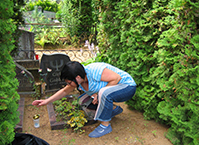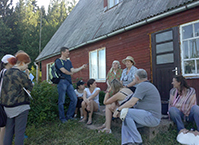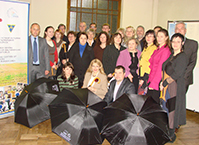Masks processions
Categories: Holidays and traditions, Anton Slishan
Story-teller: “Pagan traditions? Līgo [Midsummer night] festivities! This is a pagan tradition! Now, it is not so much, but it is maintained, maintained, how, you see, how, you see, how, you see, we ourselves… here, fires are built, and, and wreaths are made. Going mumming, you see, this tradition had been forgotten. Then we in our ensemble revived those traditions. But now people do not let in everywhere anymore. If they know you, recognize you, then they let in, but it is not interesting if you are recognized.”
Interviewer: “What did you do when you went mumming?”
Story-teller: “When we went mumming, we danced, sang, asked for presents, wished happiness, if we got presents. If people did not give presents, we pressed the door closed from outside with some pole, so that they had to get in or out through the window. But basically it was joking, playing, and singing. I know that I was allowed to go mumming, I think I was a sixth-year pupil, I was allowed to join the crowd of my peers, older and younger, then the parents allowed me to go freely around the villages.”
Interviewer: “And you had masks, hadn’t you?”
Story-teller: “One couldn’t do without a mask!”
Interviewer: “What were the masks?”
Story-teller: “Then, and also now we use simple masks. Some sock was pulled over the head or we guised as bears, or simply dressed up like Gipsies. But that old layer, you see, I haven’t bought that Aīda Rancāne’s book about the masking tradition, that old layer, what happens here, with those Lithuanian guys it is preserved, those wood, wood, wooden, or what they are called, wooden masks, those are known to nobody here, that is history. Cranes are preserved, Deaths are preserved, Corpses are preserved. But Death’s mask in my, mine, our times there was no case, even then the Death mask, because people knew that that was mumming time. But in even older times, there was the one who went to old people dressed up like Death, and the old man made water in his bed because he was frightened that his death had come. You see, a mask is a mask.”
Interviewer: “When did you go?” At what time? On Martinmas? At Christmas?”
Story-teller: “No, at Christmas! That happened, yes, about the first day of Christmas, we went in the evening, if there was celebration, if it was known that there was a wedding party or some, you know, a bender, beer had been brewed, then we went. Otherwise – we went on the second day of Christmas. You see! There were older traditions, but they disappeared in the times of kolkhozes. During the war there was a tradition, at least my father told me, that Christmas was celebrated four days, and every day the family gathered somewhere, all the relatives gathered at one, then at another family member, moved from home to home by horses. In the soviet times that already was a rare case that people moved from family to family. For instance, they knew that beer was made for Christmas, so, you see. But if there was a wedding party or any other celebration, then people were certain to go mumming, they were certain to go mumming, if there was a celebration.”
Interviewer: “Apart from wedding, to what other celebrations did people go mumming? Was that christening?”
Story-teller: “Do you mean, mumming?”
Interviewer: “Yes!”
Story-teller: “No. Basically, in our area it was done mainly at weddings and Christmas until Aizkreišņi on 4 -7 January, by that time.”
Interviewer: “Didn’t people go on other occasions?”
Story-teller: “No, later they didn’t go. Those were October mumming, that had already been eliminated in the religion, they didn’t exist anymore.”
Interviewer: “What were you treated to?”
Story-teller: “What were we treated to? At wedding parties, we were treated to everything that was on the table and sweets, and, of course, beer. But if you went so, then blood sausages, groat sausages were given, especially, if they recognized somebody. If there was someone of ours, then obligatory. But if nobody was recognized, then everything went more reservedly, but we were always given something to eat and our bags were filled with cheese, sausages and bread, and biscuits, and sweets. More sweets were given.”
Interviewer: “Was there any leader of the goings-on?”
Story-teller: “It was obligatory for somebody to take upon the leadership! Usually it was the oldest person. The oldest one if there were young people, children, one of the older, or, you see, one of the most attractive, who was able to order about, so to say, an authority, the crowd needed an authority. But if older people went, then there were usually two leaders, if parents were there – a husband and a wife, who as if, they were not in fact, you know, they as if pretended, and the others were as if their children or relatives or the like, that manner was somehow taken over from the Gypsies. So, they commanded. One more necessary thing, I have already written or said that it was necessary, said, most probably, obligatory, the leader needed a stick, a bat…”
Interviewer: “A stick.”
Story-teller: “...Obligatory.”
Interviewer: “Wasn’t there a rod, there was a stick?”
Story-teller: “A stick. It was necessary to signal that it was time to leave, if those mummers had started to romp too much, started to beat, then it was clear. And the other thing – it was used to frighten away the village dogs”
Interviewer: “So, there was no rod, was there?”
Story-teller: “No, in our area there wasn’t!”
Interviewer: “And how were those leaders of mummers named? Was there any special name?”
Story-teller: “I don’t remember, I don’t remember that anymore!”
Interviewer: “And what did that wife do? What was her main duty?”
Story-teller: “To visit the oldest ones. If they took her for a Gipsy, then she told fortunes, if they took her for a Gipsy. But, if not, then she wished, wished without telling fortune.”
Interviewer: “Were children checked somehow? Their literacy?”
Story-teller: “They were checked! There were cases that there were small kids and they were checked, asked.”
Interviewer: “Were they asked about their behaviour?”
Story-teller: “The most important thing was that, if there were young people in that home, they had to be involved. The task of the mummers was to involve, to engage them. Usually, there was one or two, who were looking for, you see, a wife, or, who needed a husband. That was an obligatory game in youth’s collectives, you see. And usually they went where they knew that there were those girls and boys going. And, if somebody liked someone, then it was clear. So it was.”
Interviewer: “Songs were sung, right?”
Story-teller: “Basically it was kaladā singing.”
Interviewer: “Kaladā singing?”
Story-teller: “Ziemassvētki sabraukuši, kaladō, kaladō! Rakstītāmi komanāmi, kaladō, kaladō! [Christmas has come, kaladō, kaladō! In adorned sledge, kaladō, kaladō!] That was the song! But the other, a newer had appeared, the newer variant, in that kūča was in the refrain. Kūča is a Christmas dish – kūča, kūča, in some places they call it koķis, I don’t know where, you see. In our area there were two variants: one was sweet and now a newer variant is made as sauce, with salty sauce, but earlier it usually was sweet.”
Interviewer: “What was it made of?”
Story-teller: “Here it has always been made of wheat.”
Interviewer: “But how was it made here?”
Story-teller: “Wheat, wheat was boiled and, and eaten either with milk, or in a moment, as in winters there was not much milk milked, or, wheat was spilled with honey, if somebody had honey, but not many had honey, or it was spilled with sugar water.”
Interviewer: “Do you mean the wheat?”
Story-teller: “Grains of wheat were boiled!”
Interviewer: “Grains of wheat!”
Story-teller: “Grains that had not split yet!”
Interviewer: “Just the grains, right!”
Story-teller: “Grains of wheat. That was called kūča! You see, and thus in one song with kūča in the refrain: Naguļu, naguļu Zīmassvētkus! Kūča, kūča! Lai muna naguļu, naguļu Zīmassvētkus! Kūča, kūča! Lai mani bērniņi veldrē nakrīt! Kūča, kūča! [I don’t sleep at Christmas! Kūča, kūča! I don’t sleep at Christmas! Kūča, kūča! For my children not to lie flat! Kūča, kūča!] And thus everything is enumerated, flax, everything, but that is a later, newer variant. When I was a child, this wasn’t sung. That is a newer variant, you see. That was the voice of mumming in the basis, the usual kaladū, kaladū.”
Images
Audio
Researcher: Dr. philol. Gatis Ozoliņš, Daugavpils Universitāte













